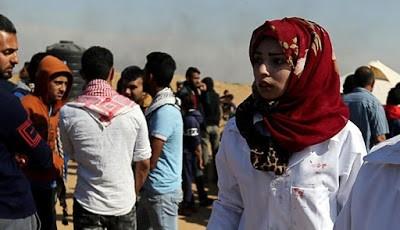Informe de ONU califica duramente exacciones cometidas por Israel contra civiles palestinos
- Información

Foto extraída de nota de prensa titulada "Ejército israelí mata a una enfermera palestina que asistía a heridos en la frontera de Gaza" (LaRed21, Uruguay).
Este 28 de febrero, se divulgó en Ginebra por parte de Naciones Unidas un informe titulado "Report of the independent international commission of inquiry on the protests in the Occupied Palestinian Territory". Se trata de un informe relativo a las exacciones cometidas por las fuerzas militares y policiales de Israel contra manifestantes palestinos en Gaza durante la denominada "Marcha del Retorno" del 2018.
El texto del informe, que consta de 22 páginas, (véase texto completo de la versión en inglés) fue elaborado por Santiago Cantón (Argentina), Sara Hossain (Bangladesh) y Kaari Betty Murungi (Kenya), en respuesta a la resolución S-28/1 (véase texto de dicha resolución), la cual fue adoptada en mayo del 2018 en el seno del Consejo de Derechos Humanos de Naciones Unidas: adoptada con 29 votos a favor (entre los que se incluye a Brasil, Chile, Cuba, Ecuador, México y Venezuela), dos en contra (Estados Unidos y Australia) y 14 abstenciones (entre las que se incluye a Panamá), la aprobación de esta resolución motivó a Estados Unidos a retirarse del Consejo de Derechos Humanos en junio del 2018 (véase breve nota nuestra al respecto).
Entre muchos de sus hallazgos, los tres expertos comisionados por el Consejo de Derechos Humanos de Naciones Unidas indican que:
" 54. On 14 May, Israeli security forces shot and killed seven children: a girl, Wisal Khalil (14), and six boys: Izzedine al-Samak (13); Said al-Kheir (15); Ahmad al-Sha’ar (15); Talal Matar (15); Saadi Abu Salah (16); and Ibrahim al-Zarqa (17).
95. Victims who were hundreds of metres away from the Israeli forces and visibly engaged in civilian activities were shot, as shown by eyewitness accounts, video footage and medical records. Journalists and medical personnel who were clearly marked as such were shot, as were children, women and persons with disabilities.
96. The Israeli security forces killed and maimed Palestinian demonstrators who did not pose an imminent threat of death or serious injury to others when they were shot, nor were they directly participating in hostilities. Less lethal alternatives remained available and substantial defences were in place, rendering the use of lethal force neither necessary nor proportionate, and therefore impermissible.
97. The commission therefore found reasonable grounds to believe that demonstrators were shot in violation of their right to life10 or of the principle of distinction under international humanitarian law ".
En el informe también se lee que:
"111. To date, the Government of Israel has consistently failed to meaningfully investigate and prosecute commanders and soldiers for crimes and violations committed against Palestinians or to provide reparation to victims in accordance with international norms. Scarce accountability measures arising out of Operations Cast Lead and Protective Edge and public comments by high-ranking public officials cast doubt over the State’s willingness to scrutinize the actions of military and civilian leadership who drafted, approved and supervised the implementation of the rules of engagement governing the actions of Israeli forces at the demonstrations" .
"115. If committed in the context of a widespread or systematic attack directed against a civilian population pursuant to or in furtherance of a State or organizational policy, serious human rights violations may also constitute crimes against humanity. Murder and “other inhumane acts” that cause great suffering or serious injury qualify as such violations. In the course of the investigation, the commission found serious human rights violations that may constitute crimes against humanity.
116. Civilian and military leaders bear responsibility for international crimes they commit directly, but also as commanders where they exert effective control over subordinates, knew or should have known about subordinates’ crimes, and failed to prevent or repress their commission or to submit them for investigation and prosecution."
Se recomienda la lectura completa del informe como tal y de sus conclusiones y recomendaciones en la parte final. De igual manera, su divulgación a algunos sectores que persisten en legitimar y en justificar, por alguna razón, el uso de la fuerza desproporcional e indiscriminado de las fuerzas israelíes contra manifestantes palestinos desarmados.
Nicolás Boeglin
Profesor de Derecho Internacional Público, Facultad de Derecho, UCR.
Contacto: nboeglin(a)gmail.com
Del mismo autor
- Embargo contra Cuba: Estados Unidos exhibe nuevamente su soledad 24/06/2021
- Infinito Gold contra Costa Rica: nuevo fracaso de minera canadiense 22/06/2021
- Elección de nuevos jueces en la Corte Interamericana de Derechos Humanos 17/06/2021
- Entrada en vigencia del Acuerdo de Escazú: algunas actividades 21/04/2021
- A propósito de un voto sobre justicia y rendición de cuentas para las víctimas palestinas 30/03/2021
- Palestine / Cour Pénale Internationale 19/03/2021
- Palestina / CPI: camino despejado para la justicia penal internacional 08/02/2021
- Irán / EEUU: CIJ se declara competente para examinar sanciones de EEUU 04/02/2021
- Acuerdo de Escazú: ratificado por Argentina y México 28/01/2021
- Guyana / Venezuela: Corte Internacional de Justicia se declara competente 22/12/2020








